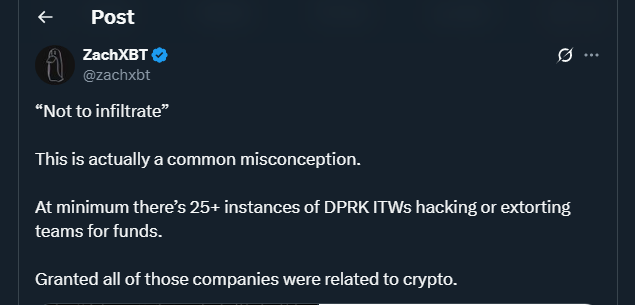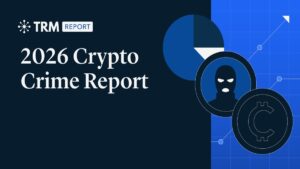TL;DR
- Blockchain investigator ZachXBT revealed evidence connecting North Korean IT workers to over 25 crypto hacks and extortion cases.
- These operatives infiltrated companies through fake identities, posing as developers or finance professionals.
- Their schemes generated billions of dollars funneled into North Korea’s weapons program.
ZachXBT has documented how North Korean IT operatives are not just seeking remote work for extra income but actively engaging in fraudulent activities to steal funds, extort employers, and manipulate crypto ecosystems. His findings contradict claims that these workers only pursue jobs to earn money without hostile intentions. Instead, their sophisticated operations demonstrate how state-backed actors exploit the blockchain industry’s open hiring practices.
In his investigation, ZachXBT uncovered multiple cases where workers embedded themselves into crypto projects, later threatening to leak sensitive data unless paid. This aligns with warnings made by industry leaders, including Binance founder Changpeng Zhao, who recently emphasized that fraudulent job applications, fake interviews, and insider bribery have become standard tactics for North Korean hackers. Recent attacks linked to outsourced service providers have cost platforms and users hundreds of millions in losses.
Cyber Operations Generate Billions For State Programs
North Korean cyber actors have stolen more than $1.3 billion across 47 incidents in 2024 and over $2.2 billion during the first half of 2025. These funds are laundered through complex international networks before being redirected to finance the country’s weapons program. The operations often involve elaborate corporate fronts. For example, Blocknovas LLC and Softglide LLC were exposed as shell entities registered in the United States under fake identities. Silent Push researchers traced these firms to non-functional addresses, confirming they were covers for Lazarus Group affiliates.
One notable case involved a fraudulent ERC-20 wallet linked to the Favrr exploit in June 2025, where insiders at the project were unmasked as DPRK operatives. Their use of stolen identities, government-issued IDs, and professional networking accounts like LinkedIn and Upwork reveals the industrial scale of this cybercrime.

Advanced Malware Campaigns Target Developers Worldwide
Beyond employment fraud, North Korean operators have expanded into advanced malware distribution. The PylangGhost campaign, uncovered in June, relied on fake skill-testing platforms built with React frameworks. Developers completing technical assessments were prompted to install malicious software disguised as video drivers. Once deployed, the malware granted persistent access while targeting over 80 browser extensions, including leading crypto wallets such as MetaMask and Phantom.











